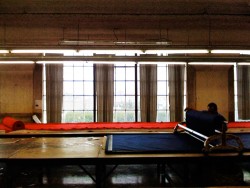 The firing of 1,800 apparently undocumented workers at American Apparel’s Los Angeles garment factory, forced by a federal investigation, is an example of the Obama administration’s new approach to workplace enforcement, which avoids the Bush administration’s militarized raids.
The firing of 1,800 apparently undocumented workers at American Apparel’s Los Angeles garment factory, forced by a federal investigation, is an example of the Obama administration’s new approach to workplace enforcement, which avoids the Bush administration’s militarized raids.
Unlike other companies targeted for immigration enforcement, American Apparel’s factory boasts positive working conditions and relatively high wages. Workers have health and life insurance, paid English classes and even masseuses on the shop floor, yet the company has still managed to compete with cheap imported clothing and grow very profitable very quickly.

News coverage mentions American Apparel’s “proprietary” production system, so the logistics that let the company treat workers well and still profit in a globalized market may not be widely known. It remains to be seen how the company will survive, given the forced firings and the fact it was already suffering heavily from the recession. (And the fact that the company’s success is probably partly a fashion or social justice fad whose novelty is doomed to fade.)
My initial reaction to yesterday’s news was that a hypocrisy had been exposed, since American Apparel’s very existence is based around its Made in the USA label, and—rightly or wrongly—I associated that label with consumers who are not fans of undocumented immigrant workers.
Then I realized that if American Apparel management guessed their employees were undocumented (they contend they didn’t), publicly embracing the workers as the part of the American workforce they are makes a statement.
Founder and CEO Dov Charney, a Canadian immigrant, has in the past spoken out for sweeping immigration reform, as described in this New York Times story. Apparently the federal investigation, started under the Bush administration, was already underway as Charney launched this ad campaign.
Meanwhile, it is impossible to ignore the fact that while shop floor conditions at American Apparel appear to be very positive, Charney’s one-on-one interactions with his employees, at least female ones, leaves a lot to be desired (as In These Times reported in 2005).
At least three ex-employees have filed sexual harassment suits against Charney, who is known to conduct business in his underwear or even while naked. He describes these habits as creative freedom, which his employees apparently don’t appreciate (see MSNBC’s report here).
Employees told Businessweek, “It was a company built on lechery,” and “I thought it was a male contemporary perspective on feminism, but it turns out to be just a gimmick.”
Many also complain American Apparel’s ads offensively sexualize and objectify young women, especially young immigrant women of color. The company markets the fact that its ads feature employees, but I wonder if they are paid as much as professional models would be.
Ultimately it is ironic that, as one worker quoted by The New York Times points out, the fired workers are likely to end up at actual sweatshops or other under-the-table, exploitative work situations in the U.S.
In other words, while the current federal workplace enforcement policy is more humane and logical than the militarized raids of the past, without comprehensive immigration reform it still comes off as a relatively pointless or purely symbolic gesture.
About the Author: Kari Lydersen, an In These Times contributing editor, is a Chicago-based journalist writing for publications including The Washington Post, the Chicago Reader and The Progressive. Her most recent book is Revolt on Goose Island.
This post originally appeared in Working In These Times on October 1, 2009. Re-printed with permission from the author.

